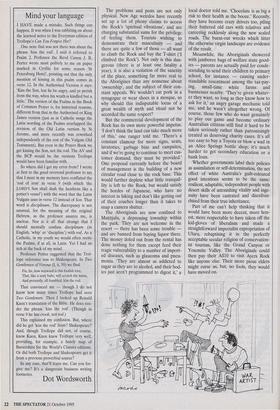Mind your language
I HAVE made a mistake. Such things can happen. It was when I was rabbiting on about the learned notes to the Everyman edition of Trollope's Can You Forgive Her?
One note that was not there was about the phrase 'kiss the rod'. I said it referred to Psalm 2. Professor the Revd Canon J. R. Porter wrote most politely to me on paper marked in Cyrillic for some reason 'St Petersburg Hotel', pointing out that the only mention of kissing in this psalm comes in verse 12. In the Authorised Version it says: 'Kiss the Son, lest he be angry, and ye perish from the way, when his wrath is kindled but a little.' The version of the Psalms in the Book of Common Prayer is, for historical reasons, different from that in the Authorised or King James version (just as in Catholic usage the Latin wording of the Psalms overlapped the revision of the Old Latin version by St Jerome, and more recently was reworked independently of the rest of the Vulgate Old Testament). But even in the Prayer Book we get kissing the Son, not the rod. The AV and the BCP would be the versions Trollope would have been familiar with.
So where did I get my error from? I wrote at first to the good reverend professor to say that I must in my memory have conflated the 'rod of iron' in verse 9 (with which 'the LORD'S Son shall dash the heathens like a potter's vessel') with the word that the Latin Vulgate uses in verse 12 instead of Son. That word is disciplinam. The discrepancy is not unusual, for the meaning of the original Hebrew, as the professor assures me, is unclear. Nor is it all that strange that I should mentally confuse disciplinam (in English, 'whip' or 'discipline') with rod. As a Catholic, in my youth we would often recite the Psalms, if at all, in Latin. Yet I had an itch at the back of my mind.
Professor Potter suggested that the Trol- lope reference was to Shakespeare. In Two Gentlemen of Verona (1, ii, 59) we find:
Fie, fie, how wayward is this foolish Love, That, like a testy babe, will scratch the nurse, And presently, all humbled, kiss the rod.
That convinced me — though I do not know how many times Trollope had seen Two Gentlemen. Then I looked up Ronald Knox's translation of the Bible. He does ren- der the phrase 'kiss the rod'. (Though in verse 9 he has crook, not rod.) This explained my confusion. But, where did he get 'kiss the rod' from? Shakespeare? And, though Trollope did not, of course, know Knox, Knox knew Trollope very well, providing, for example, a handy map of Barsetshire for the World's Classics editions. Or did both Trollope and Shakespeare get it from a previous proverbial source?
In any case, that'll learn me. Can you for- give me? It's a dangerous business writing
footnotes. Dot Wordsworth










































































 Previous page
Previous page